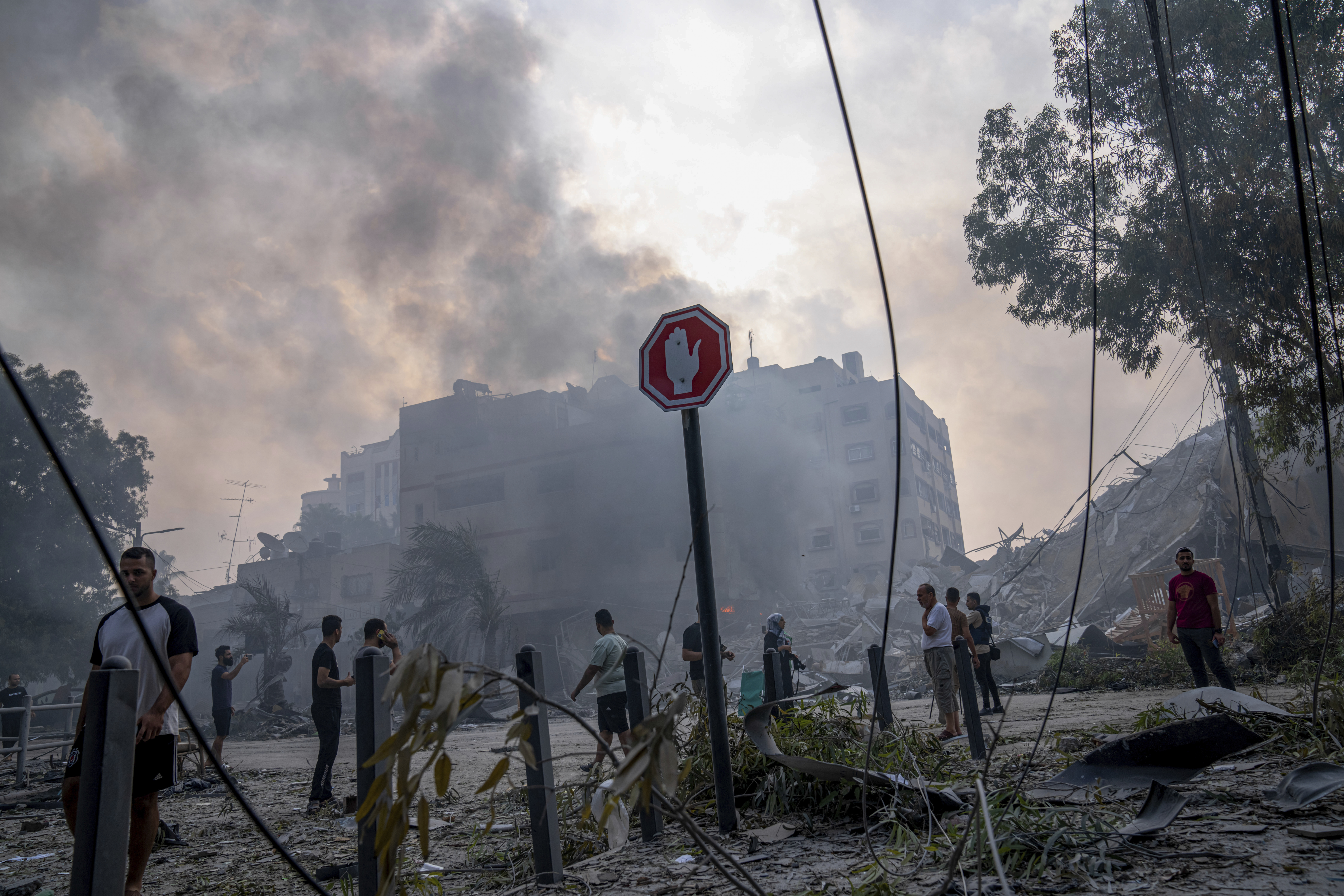‘We’ve Been Shaken Out of This Fantasy’: How the Left Sees the War in Israel
A former top aide for Bernie Sanders on how Israel's critics on the political left see the Hamas attack and what this means for deal-making in the region.


The cruel Hamas onslaught against Israel this weekend drew expressions of sympathy and solidarity from across the American political spectrum, including from some precincts of the left where Israel is regarded with suspicion or worse. For a moment, the debate about Israel that has periodically convulsed the Democratic Party — pitting pro-Israel traditionalists like Joe Biden against Israel-skeptic forces further to the left — seemed to be on pause.
It is not likely to stay that way for long, as Israel girds for a drawn-out battle directed by the most right-wing government in the country’s history. There is already anxiety churning on the American left about how Israel might respond and the possibility that a terrorist rampage could escalate into a much broader war.
To understand how progressive foreign policy thinkers are processing these events, POLITICO Magazine spoke with Matt Duss, executive vice president of the Center for International Policy. A former top foreign policy aide to Sen. Bernie Sanders (I-Vt.), Duss has been an outspoken critic of many traditional Democratic Party security policies, including those governing the U.S.-Israel relationship.
This interview has been edited and condensed for clarity.
Alex Burns: How does an event like this ripple in the world of left foreign policy? What do your text messages look like in a moment like this?
Matt Duss: First, it's just staggering: the amount of killing, the hostage-taking. There are messages that I'm getting from my Israeli friends, my Palestinian friends — grief, fear for where all this leads. We all see right now it’s not going to lead anywhere good. I think people are still trying to get their heads around the gravity of this and what this means. Others have commented on it, but I will as well: This is something on the scale of the Yom Kippur war in terms of people's perceptions. This will be seen as, I think, a pivotal moment in the region and for the U.S. relationship with the region.
Burns: Do you feel like the reaction in your circle — a circle of like-minded policy thinkers — is distinct in important ways from the reaction that we would see from the White House and the conversation that’s happening there?
Duss: Certainly. On the progressive left, you have a recognition and a respect for the rights of all people to live in security and dignity. That includes Israelis and Palestinians. I think the statements you see from most U.S. officials, including from the White House, are overwhelmingly focused on one side. It is of course quite true that Israel has the right to defend itself. Its people have a right to live in peace and security. The Palestinians have that right as well. The Center for International Policy put out a statement responding to the events of the last few days, making this point — that what Hamas has done is awful. We condemn it unequivocally. We also note that Palestinians have continued to suffer under an occupation and blockade that is decades old. That is absolutely necessary context. That does not excuse what Hamas has done. There is no excuse for that. But there is an important context of understanding where this violence grows from.
Burns: How is it possible that the national security establishment, the intelligence establishment, did not see this coming?
Duss: I mean, that's a great question. That’s a question for Israeli intelligence as well as U.S. intelligence. I think many in our system, unfortunately, have talked themselves into this idea that the Palestinian issue just doesn’t matter. No matter how many times this conflict has a way of reasserting itself on the regional and global agenda, people always try to put it back in the corner and focus on other and bigger and, as they see it, more important things.
The big shiny thing over the past few months has been this so-called normalization deal between Saudi Arabia and Israel, in my view, which is really just a U.S.-Saudi defense pact, which is being packaged as normalization — that's been the focus and one of the premises of that deal is that the Palestinians could just be kind of shunted aside and offered some crumbs here and there to keep them quiet.
I think those of us who engage with this region and its peoples understand that is a fantasy. And I think yesterday and over the past day, we've all seen how dangerous and tragic a fantasy that is.
Burns: You've been a critic of what you called the so-called normalization deal. Do you buy the idea that this attack was aimed at sabotaging that deal?
Duss: I don't think so. Just looking at the scale of this, I think we can say this has been in the works for a very, very long time. I think the drivers of this — the anger, the grievance, the suffering and the strategy — I think, is far deeper than just the Saudi-Israeli deal. Was that a consideration? Maybe. But I think it's far too simple to just to just pretend that it was all aimed at that.
Burns: You just mentioned the painful reality check on the way the foreign policy establishment tends to think about the Palestinian issue. Do you think there's a larger credibility issue at stake here for what's considered establishment foreign policy thinking — the notion that the last few years have been movement in the direction of stability and, in terms of American interests, progress in the neighborhood?
Duss: It has destroyed this whole premise that we can just bottle up the Palestinians and it won't matter. It has destroyed the premise, once again — and it's not the first time that we've been shaken out of this fantasy — that we can invest in repression, we can invest in relationships with governments that imprison their own people and deliver security and stability. It may work for a little while. But it will not work forever and when it erupts, it’s extremely dangerous and tragic. And that is what we've seen here.
Burns: How would you like to see the Biden administration handle the Netanyahu government right now?
Duss: Certainly, we need to make clear that we support keeping Israelis safe. But I think the challenge is, we’ve often supported that with very little concern for how that is done. We've kind of given a green light or, in the best cases, a kind of yellow light for keeping Israelis safe by exporting massive suffering and destructions onto Palestinians. And I think what we want to see ultimately from the Biden administration is an acknowledgment that Palestinian lives matter. Israeli lives matter. All these people’s lives matter. They have a right to keep their families safe, to live in safe communities and to have a hopeful future. And I think years of U.S. policy have not pointed us in that direction.
Burns: What would you like to see as the boundaries of an Israeli response?
Duss: Israel and the U.S. should be bound by international law with regard to the protection of civilian populations. There is a body of law relating to the conduct of war. The United States and Israel have both steadily eroded those boundaries over the last 20-plus years of the global war on terror. But if we really believe in a rules-based order, as the Biden administration continues to say, we need to recognize that that the response here is bound up with legal concepts relating to proportionality, relating to civilian harm. Supporting and observing those rules is going to keep us all safer. If we simply say that those rules can be ignored by countries we like or countries we have a special relationship with, we're not really creating a rule-based order at all. We’re creating an order of might makes right.
Burns: The statements that we’ve seen in the last 30 hours or so from people like Senator Sanders or leaders of the Congressional Progressive Caucus have been emphatically about solidarity with Israel. How much do you think there's a different conversation happening, kind of off the record, that’s more in line with the concerns you’re expressing?
Duss: Just to stay with Senator Sanders for a minute: Everyone knows his views on this topic. He has spoken more than, probably, most members of Congress on these issues. He has spoken out in support of Palestinian rights, the right of Palestinians to peace and security and dignity in their own homes and communities. He's called for an end to the occupation. However, I think his statement reflects the gravity and the absolute heinousness of the Hamas attacks. And I think that’s appropriate. I think CIP’s statement reflects that as well.
Burns: I guess I wonder how quickly you think we will hear — moving away from Senator Sanders individually — how soon we will hear progressive elected leaders speaking to the concern for Palestinians that you're articulating in this conversation.
Duss: I would expect soon. The reason we have more progressive leaders that are acknowledging these issues is that we have a progressive movement that is asking them and supporting them to say these things.
Burns: You’ve been really articulate in talking about the Ukraine war in the context of discourse about anti-imperialism and calling out people on the left who make excuses for the Russians through that lens. I wonder what your reaction is over the last day as you see some pretty similar voices talking about this attack in terms of resistance to empire in a way that clearly makes excuses for it.
Duss: I think that is disgusting and I condemn it completely. There is no justification for attacking civilians, for slaughtering civilians, for kidnapping elderly people in wheelchairs, for killing people at a rave. This is just — this is disgusting. If we believe in human dignity, if we believe in international law, I think we need to condemn that unequivocally. That does not mean we can’t have a deeper conversation about the context of the situation, Israel-Palestine. We have to have that conversation. But I think the way into that conversation has to be very clear about principles of civilian protection and very clear on how disgusting this violence is.
Burns: Is it fair to paraphrase that you’re saying there are principles more fundamental than anti-imperialism?
Duss: Yes. True anti-imperialism supports a world of rules and not might makes right. And one of those rules is the protection of civilians.












